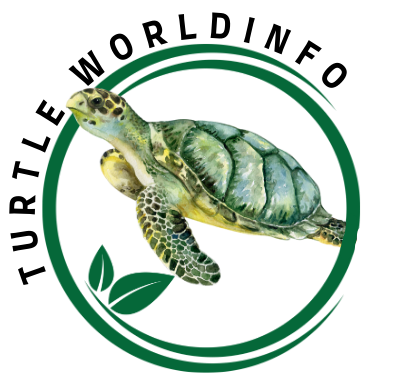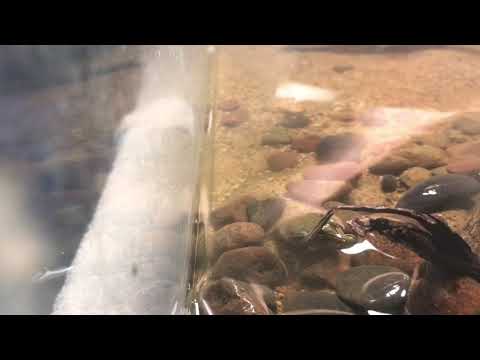Are you curious about what do baby softshell turtles eat? Softshell turtles are fascinating creatures that inhabit various freshwater habitats around the world.

If you’re a proud owner of a baby softshell turtle or considering getting one as a pet, understanding their dietary needs is crucial for their overall health and growth.
Baby softshell turtles primarily eat small aquatic invertebrates such as insects, worms, crustaceans, and small fish. They may also consume some plant matter, including aquatic plants and leafy greens.
In this blog post, we will delve into the world of baby softshell turtle diet, exploring their preferred food sources, feeding techniques, nutritional considerations, and tips for a successful feeding routine.
By the end of this article, you’ll understand what to feed your baby softshell turtle and how to ensure they thrive in its early stages.
What do baby softshell turtles eat?
As baby softshell turtles grow, their diet changes to suit their needs. They’ll eat small insects and other invertebrates when they’re firstborn. As they age, they’ll start eating fish, crayfish, and tadpoles.
A balanced diet is always important to a turtle, so supplementing their diet with vegetables or commercial turtle food can help them stay healthy. Baby softshell turtles have specific dietary needs crucial for their growth and development.
Types of Foods for a baby softshell turtle:
There are a variety of foods that you can feed your baby softshell turtle. Some of the most common include:
1. Live or frozen insects:
Baby softshell turtles are carnivorous and thrive on a diet of small insects. Offer live or frozen insects such as crickets, mealworms, waxworms, and small earthworms. These insects are rich in protein and essential nutrients.
2. Turtle pellets:
Turtle pellets are available in most pet stores and are formulated to provide a balanced diet with essential vitamins and minerals for your baby softshell turtle. Offer 1-2 small pieces of pellet food per day, depending on the size of your turtle.
3. Fruits & Vegetables:
Fruits and vegetables such as apples, carrots, zucchini, lettuce, peas, and squash can also be fed to your baby softshell turtle. Offer various fruits and vegetables so that your turtle receives an adequate balance of nutrition from its diet.
4. Commercial food sticks:
Many pet stores offer turtle-specific commercial food sticks formulated with essential vitamins and minerals for proper development and growth. These food sticks should only be offered occasionally to supplement the other foods listed above.
5. Reptile calcium powder:
Sprinkle reptile calcium powder onto insects before offering them to your baby softshell turtle on occasion. This will help provide additional nutrients required for healthy shell growth.
6. Cooked chicken or beef scraps:
Occasional treats such as cooked chicken or beef scraps can be offered in small amounts to supplement your baby softshell turtle’s diet. This should not be given as the main source of nutrition.
7. Insect larvae:
Baby softshell turtles often prey on small insect larvae such as grubs and mosquito larvae. These are excellent sources of protein for your turtle.
8. Fish:
Occasionally, you can offer small, live fish to supplement your baby softshell turtle’s diet. Offer 1-2 small fish per day, depending on the size of your turtle.
9. Earthworms:
Earthworms can also be offered to your baby softshell turtle occasionally as a delicacy. Be sure to introduce worms slowly and in moderation to avoid digestive upset or loss of appetite in your turtle.
10. Reptile vitamins & minerals:
A reptile vitamin and mineral supplement may be added to the foods listed above to provide additional nutrients for your baby softshell turtle’s optimal growth and development.
What Do Baby Softshell Turtles Eat In The Wild?
In the wild, baby softshell turtles eat various things depending on their environment.
- They may consume insects
- Small fish
- Tadpoles
- Invertebrates.
- Aquatic plants
- Algae
- Worms
- Mollusks
- Spiders
- Crustaceans
As they age, they typically eat larger prey such as crayfish, frogs, and snakes. If their habitat has a lot of vegetation, softshell turtles will also eat aquatic plants.
What Do Baby Softshell Turtles Eat in Captivity?
Baby softshell turtles have specific dietary needs that should be met in captivity. Here’s a list of foods commonly fed to baby softshell turtles in captivity:
- Commercial softshell turtle food pellets
- Earthworms
- Mealworms
- Crickets
- Bloodworms
- Fresh vegetables like lettuce, spinach, zucchini, and squash
- Commercial-prepared fish food
- Shrimp and other aquatic insects
- Live crayfish
- Live minnows and feeder fish
It’s important to supplement their diet with calcium and multivitamins regularly.
How Much Food Should Be Offered To Baby Softshell Turtles?
Feeding baby softshell turtles the appropriate amount of food is essential to ensure their nutritional needs are met without overfeeding. Here are some guidelines for determining how much food to offer to baby softshell turtles:
- Portion size: The portion size of food offered to baby softshell turtles will depend on their age, size, and individual appetite. As a general rule, offer a portion of food that can be consumed within 5 to 10 minutes. This allows them to eat their fill without excessive leftovers.
- Frequency: Young baby turtles should be offered food once per day. As they get older, offer them food two to three times a week. Adult softshell turtles can be fed two to three times a week.
- Type of Food: Baby softshell turtles should be fed mainly fresh vegetables, chopped worms, and commercial turtle pellets or sticks. They may also enjoy insects and small fish occasionally as treats.
- Feeding frequency: Baby softshell turtles are typically fed daily or every other day, depending on their age and growth rate. Younger turtles may require daily feedings, while older ones can be fed every other day. Adjust the feeding frequency based on their appetite and growth rate, ensuring they have time to digest their food.
- Monitoring Weight: It’s important to monitor your baby softshell turtle’s weight regularly. Regular monitoring can help you ensure that your turtle is getting the proper nutrition and eating the right amount of food. Consult an experienced veterinarian if you have any questions or concerns about your turtle’s diet.
- Observation: Observe the baby softshell turtle’s behavior during feeding. If they actively eat and readily consume the offered food, it indicates they are hungry and accepting the portion size. However, if they lose interest or show signs of being full (e.g., ignoring the food or swimming away), they have had enough.
- Avoid overfeeding: Overfeeding can lead to health problems such as obesity and shell deformities. It’s better to underfeed slightly than to overfeed. Uneaten food should be promptly removed from the tank to maintain water quality.
Remember that these guidelines serve as general recommendations and individual variations may occur.
General guidelines for feeding baby softshell turtles
When it comes to feeding baby softshell turtles, you should follow a few general guidelines.
- You should always consult a veterinarian or experienced turtle keeper before feeding your turtle. It’s also important to research what types of food are appropriate for your specific turtle species.
- You should feed your baby softshell turtle 3-4 times a week, offering small portions each time.
- Offer various foods, such as small worms, mealworms, crickets, minnows, bloodworms, earthworms, or commercial turtle diets. Avoid overfeeding, as this can lead to nutritional deficiencies and obesity.
- Clean the turtle tank after every feeding to prevent disease and maintain water quality.
- It is important to properly store any leftover food in the refrigerator and use it within 24 hours after opening to avoid bacterial growth.
- If you notice any changes in your turtle’s behavior or health, always contact a veterinarian for advice.
By following these guidelines, you can ensure that your baby softshell turtle gets the proper nutrition to grow healthy and strong.
Conclusion
Taking care of baby softshell turtles can be a fun and rewarding experience. Knowing what food they should eat is essential to keeping them healthy and happy.
Baby softshell turtles typically thrive on a diet of live insects, commercial turtle pellets, small fish, aquatic plants, and the occasional reptile treat fed in moderation.
With patience and dedication, you can ensure your new reptilian family members receive all the nutrition they need for adulthood.
I hope this article has provided the information you need to provide your baby softshell turtles with a well-balanced diet. In addition to their food, they should also be provided with clean water and plenty of space to swim, bask in the sun, and explore their environment.
Your baby softshell turtles can grow healthy and strong into adulthood with proper care and the right diet.
FAQ:
How often should I feed my baby softshell turtle?
You should feed your baby softshell turtle 2-3 times per week. Offer them a variety of food items to ensure they get all the nutrients they need.
What are some signs that my baby softshell turtle isn’t eating enough?
Some signs that your baby softshell turtle isn’t getting enough food include weight loss, lethargy, and refusal to eat. If you notice any of these signs, consult a veterinarian to ensure your pet is healthy and receiving the proper nutrition.
Do baby softshell turtles need a particular type of housing?
Yes, baby softshell turtles need an aquarium or terrarium that meets specific requirements. The enclosure should be securely closed and meet the minimum size for their species. It should also have appropriate lighting, filtration, and a basking spot with the correct temperature.

